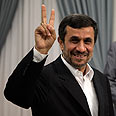
Iranian President Mahmoud Ahmadinejad said Thursday that the Islamic republic will not be hurt by newly imposed Western sanctions, Iran's state television website reported.
On Tuesday, the European Union adopted an oil embargo on Iran, while the US blacklisted Tehran's third-largest bank.
Related stories:
- EU adopts oil embargo on Iran
- ISIS: Iran won't pursue nukes in 2012
-
Obama: All options on the table on Iran
“Once our trade with the Europe was around 90% but now it has reached to 10%... Experience has shown that Iranian nation will not be hurt," Ahmadinejad said.
“For the past 30 years the Americans have not been buying oil from us. Our central bank has no relations with the US,” he added.
The Iranian president further added that Tehran was ready for talks with western powers over its nuclear program.
Ahmadinejad also agreed to increase interest rates to 21%, reversing his opposition to the move economists said was crucial to supporting the Iranian currency.
The move came as the rial, under pressure after new sanctions targeting Iran's Central Bank, shed about 50% of its value relative to the dollar in the span of a month.
The depreciation built on already mounting worries over the country's growing international isolation over its controversial nuclear program. The European Union earlier this week approved an oil embargo on Iranian crude.
"The president has fully approved" the increase in bank interest rates, Economy Minister Shamseddin Hosseini said.
Also on Thursday, China criticized the EU's sanctions on Iran, saying the measures were "not constructive."
"To blindly pressure and impose sanctions on Iran are not constructive approaches," China's Foreign Ministry said.
Beijing's economic ties with Tehran have expanded in recent years, partly thanks to the withdrawal of Western companies in line with sanctions against the Islamic republic over its nuclear drive.
The Asian powerhouse also depends a lot on Iranian oil, and has strengthened its presence in the country's oil and gas sector by signing a series of contracts worth up to $40 billion in the past few years
Iranian officials downplayed that the latest sanctions were affecting the currency or the economy. In an indication of the growing rift in Tehran, however, Bahmani acknowledged with rare candor earlier this month that the "psychological effects" of sanctions are partly behind the pressure on the currency.
AP and AFP contributed to this report
- Receive Ynetnews updates
directly to your desktop















